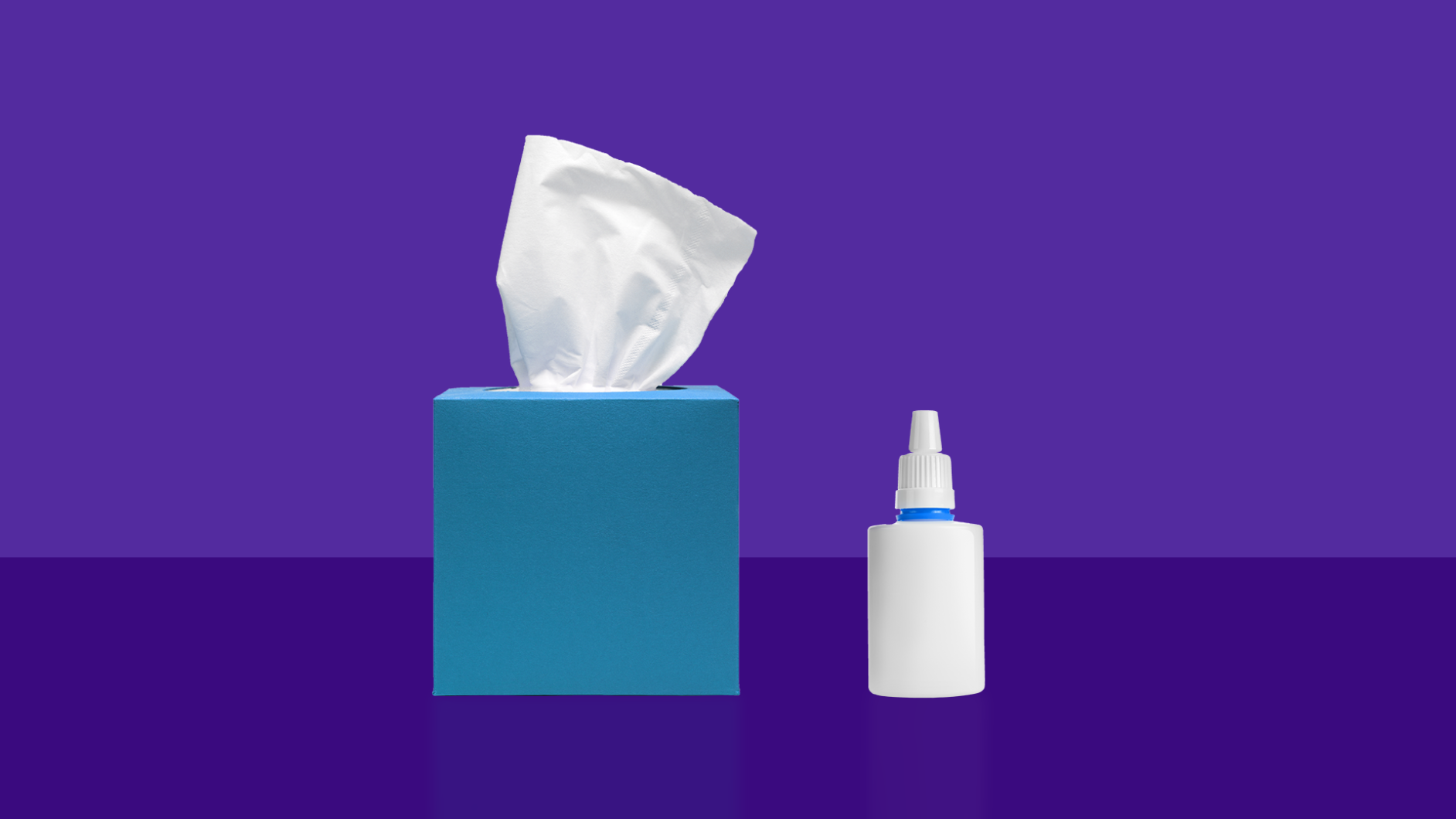If you’re using Afrin for seasonal allergies or an upper respiratory infection, your friends may warn you about the dangers of Afrin addiction. “If you use it once, your body will become dependent on it,” they say. Doctors call this phenomenon “rebound congestion,” or rhinitis medicamentosa, and it is a very real problem. In fact, it could be responsible for up to 9% of visits to allergists and ENT doctors.
Is nasal spray addiction real?
Before discussing Afrin nasal spray addiction, we have to answer: What is Afrin? Afrin (oxymetazoline) is a nasal decongestant spray used to relieve a stuffy nose and sinus pressure. Afrin isn’t the only culprit of rebound nasal congestion. Nasal decongestant sprays, which reduce nasal swelling and congestion by constricting the blood vessels in the nose, include Afrin (oxymetazoline), Neo-Synephrine (phenylephrine), Otrivine (xylometazoline), and Privine (naphazoline).
RELATED: What is Afrin?
As cold and flu season begins, you may be interested in using this OTC remedy. But you should beware of the side effects of using it too often.
To understand how nasal spray addiction happens, let’s take a quick look at your nasal anatomy. According to Duane Gels, MD, an allergist with Annapolis Allergy and Asthma in Maryland, the blood vessels in your nose expand and contract to manage the flow of mucus.
“The nose is packed with blood vessels,” Dr. Gels says. “As our position changes from standing to sitting to lying down, the weight of the blood shifts.” This keeps your nose from clogging up when you change positions.
Adrenaline can change blood flow to your nose as well. “Adrenaline released into the blood during a fight or flight response (such as running to evade a predator) attaches to receptors in the nose, widening the passages so we can breathe easier,” Dr. Gels explains.
He explains that oxymetazoline (the active ingredient in Afrin) actually works by mimicking adrenaline in your nose. It forces your nostrils open by squeezing the blood out of your nasal tissues. When you spray a shot of Afrin nasal spray into your nose, you will feel immediate relief from congestion—but the effects don’t last.
Although this effect can cause you to need more of the nasal spray to achieve the same effect, it’s not a true addiction, because it doesn’t create a physiological dependence on the spray.
While the results of Afrin use are short-lived, the side effects—like rebound congestion—are not.
What is rebound congestion?
When the blood drains from your nose, so do the oxygen and nutrients that blood brings with it. Your nasal tissues need these things, so once the Afrin wears off, your body overcompensates by drawing more blood to your nose, and you feel even more congested than you did before—which makes you want to use it again.
“Rebound congestion is increasing nasal congestion as the decongestant nasal spray wears off, causing the patient to use more spray to combat the continued congestion,” explains Susan Besser, MD, a primary care provider specializing in family medicine at Mercy Personal Physicians in Baltimore. “So, the patient continually feels a need to use the spray to combat the continued congestion. In effect, this leads to dependency on the medication to control the symptoms.”
In other words, it becomes a vicious cycle. After a few days of use, the nasal spray will relieve your congestion for shorter and shorter periods of time, causing a rebound effect. The rebound congestion can get so bad that eventually, the Afrin doesn’t clear your airway at all. The problem can go on for months to years.
RELATED: Afrin vs. Flonase
Symptoms of nasal spray overuse
So, how do you know if you’re addicted? Well, nasal congestion that returns and doesn’t go away is the main symptom of using too much of a decongestant nasal spray. The main symptom of congestion is a stuffy nose. However, you may experience a feeling of needing to use more and more of the spray just to be able to breathe regularly.
If you experience rebound congestion, it’s possible you may experience other symptoms such as:
- Itchy nose/nasal passages
- Sneezing
- Runny nose
Not all cases of rebound congestion will cause symptoms other than nasal congestion. Symptoms other than nasal congestion may be attributed to other causes, such as allergies. In severe cases, overuse of a decongestant spray can lead to damage and inflammation of the nasal tissue. Your healthcare provider may recommend stopping the spray and starting a different treatment.
Rebound congestion treatment
How do you treat this vicious cycle? The best way to break an Afrin addiction, according to Dr. Besser, is to stop taking the medication cold turkey. “Expect to be miserable for a few days while the body recovers,” she says. The following measures can be taken while the body recovers:
- Use a nasal steroid, such as Flonase (fluticasone), to help reduce congestion and inflammation in the nasal passages.
- Use an antihistamine spray such as Astepro (azelastine), which can help treat congestion and other nasal symptoms caused by allergies.
- Try a saline nasal spray, which can help drain and loosen the mucus causing congestion.
- Try an oral decongestant like Sudafed (pseudoephedrine) or Sudafed PE (phenylephrine) can help relieve inflammation and congestion in the nose after stopping a decongestant spray.
- Use limited doses of Afrin as a last resort. If you feel only Afrin spray will work, Dr. Besser says, it’s okay for a day or two. “I have even seen ENT doctors recommend it for very limited use,” she says. “But I wouldn’t suggest reaching for it first; use all other measures before Afrin.”
To avoid Afrin dependence in the first place, there are several other treatment options for nasal congestion that won’t trigger a dependence.
“If the problem is allergies, topical nasal steroids (Flonase and Nasacort) reduce allergic inflammation over a couple days,” Dr. Gels says. “These are available over the counter. Prescription Singulair (montelukast) can also improve nasal congestion.”
Alternate nasal spray options
The good news? Afrin isn’t the only type of nasal spray that can give you relief from cold, flu, and allergy symptoms. There are several types of nasal sprays, including:
- Nasal steroid sprays work by decreasing inflammation to improve symptoms like nasal congestion, sneezing, runny nose, and watery eyes. Taken one to two times per day for several weeks, these sprays include Rhinocort (budesonide), Omnaris (ciclesonide), Flonase (fluticasone), and Nasalide (flunisolide).
- Nasal antihistamine sprays like Astepro (azelastine) and Patanase (olopatadine) work by blocking antihistamines to relieve a runny nose caused by allergies.
- Combination steroid and antihistamine nasal sprays like Dymista, containing fluticasone and azelastine, are available by prescription.
- Nasal anticholinergic sprays like Atrovent (ipratropium bromide) help treat runny noses from allergies and other causes.
- Nasal cromolyn sodium spray, or Nasalcrom (cromolyn sodium), relieves sneezing, runny nose, and nasal congestion from allergies.
- Nasal saline sprays like Simply Saline can help thin and loosen mucus to reduce nasal congestion.
RELATED: What is Flonase? | What is Nasacort? | What is Singulair?
The bottom line
If you use a nasal decongestant spray like Afrin for more than three days, you may experience such rebound nasal congestion, which can lead to irritation and inflammation. When you stop using the spray, that severe nasal congestion can be quite uncomfortable. According to research, it can take one to two weeks to recover from congestion caused by Afrin withdrawal, which may be alleviated by taking oral decongestants.
Rebound congestion is a surprisingly common problem that can cause you months or years of agonized breathing. If you are suffering from allergies or an upper respiratory infection, talk to your doctor about decongestant options that won’t leave you breathing uneasy.











